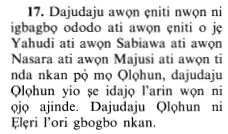22vs17
Select any filter and click on Go! to see results
إِنَّ الَّذِينَ آمَنُوا وَالَّذِينَ هَادُوا وَالصَّابِئِينَ وَالنَّصَارَى وَالْمَجُوسَ وَالَّذِينَ أَشْرَكُوا إِنَّ اللَّهَ يَفْصِلُ بَيْنَهُمْ يَوْمَ الْقِيَامَةِ إِنَّ اللَّهَ عَلَى كُلِّ شَيْءٍ شَهِيدٌ
Inna allatheena amanoo waallatheena hadoo waalssabieena waalnnasara waalmajoosa waallatheena ashrakoo inna Allaha yafsilu baynahum yawma alqiyamati inna Allaha AAala kulli shayin shaheedun
Index Terms
Click to play
Yoruba Translation

Hausa Translation
Lalle ne waɗanda suka yi ĩmãni da waɗanda suka tũba(1) (Yahũdu) da waɗanda suka karkace (Saba´ãwa) da Nasãra da Majũsãwa da waɗanda suka yi shirka, lalle ne Allah Yanã yin hukunci a tsakãninsu a Ranãr Ƙiyãma.Lalle ne Allah Mahalarci ne a kan dukkan kõme.
Asbabu n-Nuzuul (Occasions of Revelation)
Allah will judge between the Sects on the Day of Resurrection
Allah says:
إِنَّ الَّذِينَ آمَنُوا وَالَّذِينَ هَادُوا وَالصَّابِئِينَ وَالنَّصَارَى وَالْمَجُوسَ وَالَّذِينَ أَشْرَكُوا إِنَّ اللَّهَ يَفْصِلُ بَيْنَهُمْ يَوْمَ الْقِيَامَةِ إِنَّ اللَّهَ عَلَى كُلِّ شَيْءٍ شَهِيدٌ ﴿١٧﴾
Verily, those who believe, and those who are Jews, and the Sabians, and the Christians, and the Majus, and those who worship others besides Allah; truly, Allah will judge between them on the Day of Resurrection.
Verily, Allah is over all things a Witness.
Allah tells us about the followers of these various religions, the believers (Muslims) and others such as the Jews and Sabians.
We have already seen a definition of them in Surah Al-Baqarah and have noted how people differ over who they are. There are also the Christians, Majus and others who worship others alongside Allah. Allah will (يَفْصِلُ بَيْنَهُمْ يَوْمَ الْقِيَامَةِ judge between them on the Day of Resurrection) with justice;
He will admit those who believed in Him to Paradise and will send those who disbelieved in Him to Hell, for He is a Witness over their deeds, and He knows all that they say and all that they do in secret, and conceal in their breast.
يخبر تعالى عن أهل هذه الأديان المختلفة من المؤمنين ومن سواهم من اليهود والصابئين وقد قدمنا في سورة البقرة التعريف بهم واختلاف الناس فيهم والنصارى والمجوس والذين أشركوا فعبدوا مع الله غيره فإنه تعالى " يفصل بينهم يوم القيامة " ويحكم بينهم بالعدل فيدخل من آمن به الجنة ومن كفر به النار فإنه تعالى شهيد على أفعالهم حفيظ لأقوالهم عليم بسرائرهم وما تكن ضمائرهم .
"إن الذين آمنوا والذين هادوا" هم اليهود "والصابئين" طائفة منهم "والنصارى والمجوس والذين أشركوا إن الله يفصل بينهم يوم القيامة" بإدخال المؤمنين الجنة وإدخال غيرهم النار "إن الله على كل شيء" من عملهم "شهيد" عالم به علم مشاهدة
أي بالله وبمحمد صلى الله عليه وسلم .
I'raab - grammatical analysis of the Qur'an
«إِنَّ» حرف مشبه بالفعل «الَّذِينَ» اسم موصول اسم إن «آمَنُوا» ماض وفاعله والجملة صلة «وَ الَّذِينَ» معطوفة على الذين قبلها «هادُوا» معطوف على ما سبق وإعرابه مثله «وَ الصَّابِئِينَ» هم عبدة الكواكب معطوف على
اسم إن منصوب بالياء لأنه جمع مذكر سالم «وَالنَّصارى » معطوف على الذين وهو منصوب مثله بالفتحة المقدرة على الألف للتعذر «وَالْمَجُوسَ» معطوف على ما قبله «وَالَّذِينَ» اسم موصول محله النصب مثل ما عطف عليه «أَشْرَكُوا» ماض وفاعله والجملة صلة «إِنَّ اللَّهَ» إن ولفظ الجلالة اسمها «يَفْصِلُ» مضارع مرفوع والفاعل مستتر والجملة خبر «بَيْنَهُمْ» ظرف مكان متعلق بيفصل والهاء مضاف إليه «يَوْمَ» ظرف زمان متعلق بيفصل «الْقِيامَةِ» مضاف إليه وجملة إن اللّه إلخ في محل رفع خبر إن الأولى «إِنَّ اللَّهَ» لفظ الجلالة اسم إن «عَلى كُلِّ» متعلقان بالخبر «شَيْ ءٍ» مضاف إليه «شَهِيدٌ» خبر إن المرفوع والجملة استئنافية لا محل لها
